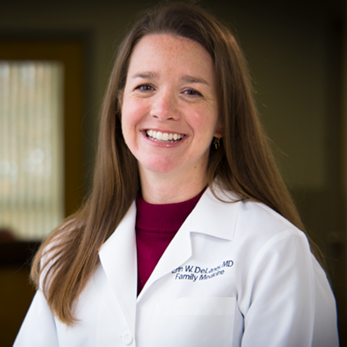“Exercise is Medicine” Program Helps Patient Move Toward Healthier Lifestyles
When Jeremy Pritchett first visited the family medicine clinic at UAB Medicine’s Hoover location, he was thinking mostly about his kidneys. He had just had a kidney stone and Sumayah Abed, M.D., a practitioner at the Hoover clinic and assistant professor in UAB’s Department of Family and Community Medicine, was running follow-up tests.
Read moreStrengthening America’s Healthcare System: 5 Key Points from Asif’s Discussion With “The Hill”

On Tuesday, Irfan Asif, M.D., professor and chair of the Department of Family and Community Medicine and associate dean for primary care and rural health in the UAB Heersink School of Medicine, joined other health care leaders to discuss strategies for improving access to health care in the United States.
Read moreA Framework for Enjoying the Holidays While Not Putting Mental Health on the Backburner

The holiday season can be full of tradition, time with loved ones, and space to rest and look forward to a new year. The season may also bring up feelings of loss, stress, and exhaustion.
Read moreHoliday Video 2021
Happy Holidays from the Department of Family and Community Medicine!
Serving the State: An Interview with Statewide AHEC Director Michael Faircloth, M.D.
 Michael Faircloth, M.D.Michael Faircloth, M.D., grew up in a small, rural town in Alabama. His brother was born with Down syndrome and the care he received, even in a town with few resources, inspired Faircloth to put his interest in science to use in service of others: he decided to go to medical school to become a family medicine physician.
Michael Faircloth, M.D.Michael Faircloth, M.D., grew up in a small, rural town in Alabama. His brother was born with Down syndrome and the care he received, even in a town with few resources, inspired Faircloth to put his interest in science to use in service of others: he decided to go to medical school to become a family medicine physician.
UAB Hoover Family and Community Medicine, Providers Honored for Excellent Patient Experience

The Department of Family and Community Medicine has won several awards in 2021 for provider and clinical excellence. We are proud to honor the outstanding work of our teams across our clinics.
Read moreNational Rural Health Day: These Medical Students Are Ready to Serve the Rural Areas That Shaped Them.
When they look toward their future in medicine, UAB Heersink School of Medicine students Carla Brown and Ellie Pitchford both envision practicing medicine in rural communities similar to the ones that shaped them.
Read morePreventing Diabetes Before It Becomes a Diagnosis: Diabetes Awareness Month

One in 10 Americans has diabetes and more than 88 million have prediabetes. With an often-irreversible diagnosis and lasting health implications, diabetes is a disease that can be prevented with the right strategies and support. For National Diabetes Awareness Month, two providers in the Department of Family and Community Medicine are sharing tips on how to prevent diabetes altogether.
Read moreSpecial Topics Course Introduces Students to Key Procedures in Family Medicine
In mid-October, 25 medical students gathered for a Special Topics course teaching procedures that could become a frequent feature of their lives if they go into family medicine.
Read moreBecky Reamey, Ph.D., to Serve as Alabama Statewide AHEC Associate Director
 Becky Reamey, Ph.D.The Alabama Statewide Area Health Education Centers (AHEC) Program announces the appointment of Rebecca A. Reamey, Ph.D., to fill the position of Associate Director upon the retirement of Glenda Stanley. Reamey joins Alabama AHEC at an auspicious time as the organization transitions back to normal operations after many months spent in COVID-19 relief. It has been a period of great growth in terms of increased outreach and potential for the development and fostering of diverse partnerships upon which Alabama AHEC hopes to capitalize in the coming months.
Becky Reamey, Ph.D.The Alabama Statewide Area Health Education Centers (AHEC) Program announces the appointment of Rebecca A. Reamey, Ph.D., to fill the position of Associate Director upon the retirement of Glenda Stanley. Reamey joins Alabama AHEC at an auspicious time as the organization transitions back to normal operations after many months spent in COVID-19 relief. It has been a period of great growth in terms of increased outreach and potential for the development and fostering of diverse partnerships upon which Alabama AHEC hopes to capitalize in the coming months.
Q&A: 5 Questions for UAB’s Sports and Exercise Medicine Fellows
Fall sports are in full swing in Birmingham, and UAB Sports and Exercise Medicine fellows Matthew Miesch, M.D., and Christian Muller, D.O., are in the middle of it all, whether courtside in Bartow Arena, on the sidelines at high school football games or at the ice rink with the Birmingham Bulls.
Read moreTelehealth and Nutrition Counseling: Pandemic Reveals Advantages to Talking About Nutrition Virtually

According to the Center for Disease Control and Prevention (CDC), use of telehealth visits increased 50% at the beginning of 2020. The COVID-19 pandemic has changed the way that many providers offer care, and it has created new ways for patients to connect with care teams from their homes.
Read moreStorytelling in Medicine Gives Students Opportunities to Reflect, Provide Better Care and Advocate
 Claire Wilson, MS2At the same time that the world was reckoning with widespread outcry after the killing of George Floyd by a Minneapolis police officer and dealing with the growing impact of the COVID-19 pandemic, Claire Wilson was experiencing a number of changes in her personal life. During her first year of medical school, a stressful and stretching time by itself, Wilson was managing family challenges and working through her own reactions to COVID-19 as an emerging medical provider and the racial injustice conversations happening around her as a multiracial woman.
Claire Wilson, MS2At the same time that the world was reckoning with widespread outcry after the killing of George Floyd by a Minneapolis police officer and dealing with the growing impact of the COVID-19 pandemic, Claire Wilson was experiencing a number of changes in her personal life. During her first year of medical school, a stressful and stretching time by itself, Wilson was managing family challenges and working through her own reactions to COVID-19 as an emerging medical provider and the racial injustice conversations happening around her as a multiracial woman.
Sports and Exercise Medicine Fellows Provide Comprehensive Coverage to Local Teams

Student athletes are back and ready for a new season and the Sports and Exercise Medicine fellows at the University of Alabama at Birmingham are ready to provide the care they need.
Read moreGlenda Stanley Retires After 20 Years of Serving AHEC
Glenda Stanley, MA, Associate Director of the Alabama Statewide Area Health Education Centers (AHEC) Program retired in October. Stanley has served the National AHEC Organization for over 20 years.
Read moreSelma Faculty Leaders Promoted to Associate Professor
 Tiffani Maycock, D.O.Two faculty members from the UAB Selma Family Medicine Residency Program were promoted to associate professor in August 2021. Tiffani Maycock, D.O., residency program director, and Maria Oquendo, M.D., both received the promotion based on their achievements in resident education and patient care in Selma.
Tiffani Maycock, D.O.Two faculty members from the UAB Selma Family Medicine Residency Program were promoted to associate professor in August 2021. Tiffani Maycock, D.O., residency program director, and Maria Oquendo, M.D., both received the promotion based on their achievements in resident education and patient care in Selma.
The Pandemic is Increasing Intimate Partner Violence. Here’s How Health Care Providers Can Help.

Among the hidden costs of the COVID-19 pandemic is an alarming rise in domestic violence and intimate partner violence, a form of domestic violence in sexual and romantic relationships with devastating effects that can ripple across generations.
Read moreBuilding Strong Relationships: Generations of Primary Care
 Erin DeLaney, M.D. Debbie and Johnny Scogin have been UAB Family Medicine patients since the mid-1980s. The Scogins were patients of Robert E. Kynerd, M.D., for 20 years, once he retired he referred them to Erin DeLaney, M.D., a family medicine physician, vice-chair for clinical affairs and quality, assistant professor and medical director for the Department of Family and Community at UAB Medicine-Highlands.
Erin DeLaney, M.D. Debbie and Johnny Scogin have been UAB Family Medicine patients since the mid-1980s. The Scogins were patients of Robert E. Kynerd, M.D., for 20 years, once he retired he referred them to Erin DeLaney, M.D., a family medicine physician, vice-chair for clinical affairs and quality, assistant professor and medical director for the Department of Family and Community at UAB Medicine-Highlands.
Department to Offer Additional Prizes for UAB National Essay Contest Applicants
The American Academy of Family Physicians Foundation’s Center for the History of Family Medicine is accepting applicants for their 2021 essay contest. Essays must center on the history of family medicine but can include creative elements. Winners of the national contest can win up to $1,000 for their essay, and the Department of Family and Community Medicine is offering additional prizes for UAB applicants to encourage participation.
Read moreCU2RE program awarded $5.2 million in supplemental HRSA funding
The Comprehensive Urban Underserved and Rural Experience (CU2RE) program has received a supplemental award from the Health Resources and Services Administration (HRSA) for $5.2 million.
Read more